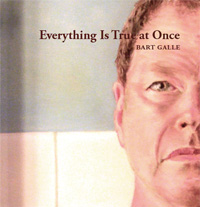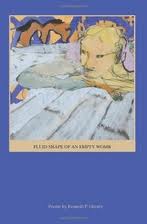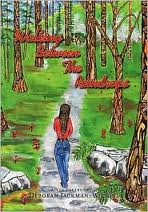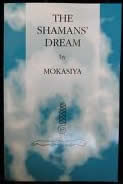Books Noted
- Bart Galle, Everything Is True at Once
- Kenneth P. Gurney, Fluid Shape of an Empty Womb
- Deborah Jackman-Wilson, Walking Between The Raindrops
- Richard Kovac, Untitled, Poems
- Mokasiya, The Shamans’ Dream
- Georgia Ressmeyer, Today I Threw My Watch Away
- Robert Sonkowsky, Unsound Science
- Diana Woodcock, In the Shade of the Sidra Tree
Untitled by Richard Kovac, PM Books 2008. $15 
Nowadays many people publish poems in one or two books that capture something of their lives in this millennial turning point. I think of these books as dwellings where the poets live and express their emotional and intellectual lives. As readers, thanks to the relative ease of publishing, we can tour the different neighborhoods that have grown up and see how people are thinking and feeling.
Ricahrd Kovac has written one such book, Untitled. Kovac’s Catholicism permeates his worldview and his poems. Sometimes he cites the Good Book, as in “ Dark Glasses,” given here in its entirety: “Vision is good/for/knocking down/blind men.//(John 9:40, 41)//Invariably/the blind man says,/“Excuse me. . . .” [28] He considers the sinners of the world, their greed, lust and foolishness, without romanticism or sentiment. “[I]f all the blades of grass/were dollar bills/how happy we’d all be,” he writes [“Green Beauty,” 34] He knows to keep his language simple and straightforward, as in this succinct condemnation of a bully:
Martin
with contempt over-foaming
sits in his armchair
after “a hard day’s work.”
He considers himself
an Intellectual
while drinking LoneStar—
an Intellectual
dwelling among HS dropouts:
drinking LoneStar
switching stations
analyzing the commercials
with his keen mind,
telling his wife
how stupid she is.This performance
is not lost
on his children,
who despise his chair
“ex cathedra,”
and plan
more active crimes
than his.[“Martin’s Children,” 25]
He understands his strengths and limitations as a poet. Rather than playing with language, indulging in complicated metaphysics, or erupting, like so much modern and post-modern poetry, from an subconscious dream world, these short poems take a clear moral view.
“In Xanadu with Amelia” surveys the world’s tumescence, the corruption on a Brooklyn street, where Amelia, once a firebrand, is now an aging prostitute. Noting Amelia’s predicament, the poet writes, “This world is the funeral/of the world that was.” Elsewhere, too, Kovac portrays odd-ball characters like the “seeing-eye man” with the blind dog and a guard-dog cat whose meow “warned of Jiggers the cop, when/they robbed the pushcarts/on Fulton Street.” [36]
There’s humor, too, as when the poet describes sitting in the Zen Center in San Francisco as a novice, feeling constipated and finding his satori at last: “cod liver oil.” [29] The universe, or human life on this planet at least, is a Ferris Wheel “of terror & delight” [30] where no refunds are possible. In his best work, Kovac has an knack for arresting metaphor: A lady’s new Saab, for example, is “her fat yacht sailing the suburbs” [31].
—Zara Raab
Zara Raab’s Swimming the Eel is due out this fall. Her work appears in West Branch, Arts & Letters, The Dark Horse, River Styx and elsewhere. Her reviews and essays appear in Redwood Coast Review, Poetry Flash, The Review Review, Colorado Review and elsewhere. She attended U. Michigan and has a niece who teaches at U. Wisconsin.
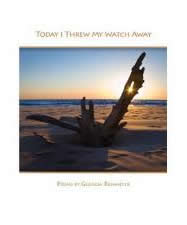 Today I Threw My Watch Away by Georgia Ressmeyer. Finishing Line Press, 2010. $14
Today I Threw My Watch Away by Georgia Ressmeyer. Finishing Line Press, 2010. $14
The title poem is the collection's first piece. The title is also “sentence one” of the statement that the poem makes, a technique that we also see later in “When March Arrives.” In fact, the volume's title could be seen as “sentence one” of the entire collection, the fruit of the author's retirement. Stylistically, Ressmeyer tends towards short lines with a palette drawn from meteorology, especially fog and rain. The twenty five poems here would look good with wood cut illustrations, even the sonnet that closes the collection.
Sometimes, Ressmeyer seems almost cubist or classically Japanese as she writes and rewrites her own private Mount Fujis. This approach is most evident in “Passion for Pulp,” about eating an orange in a sunny room:
The pulp of this day's fruit
cannot be tasted without
piercing its thick, gold skin.Passion must be proved before
the juicy, saffron core of
morning's light will be given.It does not come pre-cut or
peeled or squeezed but must
be cradled in my palm andbitten, not as a conquered
object but as a tang to be
savored, yielding its healing
Ressmeyer uses clothing to personify. March is a woman with an untucked blouse and a tangled skirt. Elsewhere, Fog also has to tuck in its blouse. A snowy tree does not mind whether the sun melts her dress or not. But Ressmeyer doesn't always use clothing to personify: Runoff “roams the neighborhood / in packs, nipping at garbage.” Fog sends “probing fingers up / the streets, picking the locks.” “Early summer,” she tells us, “is a cottage dweller.” Ressmeyer's use of personification balances the absence of a strong "lyrical I" in the verses. It helps the reader stay in touch with the humanity of these poems without having to mediate an ego.
The organizing principle for the shortish lines in this collection seems to be syllabic rather than semantic or imagistic. Alliteration, assonance, and apostrophe are all used pleasantly. Ressmeyer's muse is calm and even-tempered. Read her:
When the lake is pure sheen
in summer haze
silver-white with a bluish blush
…then, in response, my bare feet
pull the water on
as a second skin.
—Judith Swann
Judy Swann lives in gorgeous Ithaca, NY in a small house painted in Frida Kahlo colors. Her poetry has appeared in Lilliput Review, Verse Wisconsin, Soundzine and other places both in print and online. She is an Iowan who often visited Wisconsin in her youth.
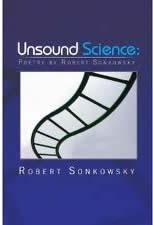 Unsound Science by Robert Sonkowsky, Xlibris Corporation, 2010.
Unsound Science by Robert Sonkowsky, Xlibris Corporation, 2010.
With experience as a university professor and professional actor, Robert Sonkowsky felt inspired by the just-past Wisconsin Poet Laureate, Marilyn Taylor, to self-publish forty-six poems. He doesn’t show a list of poems previously published so I gather that he made and then kept these poems over perhaps decades wanting to have them read.
I enjoyed most of them them: Sonkowsky possesses a lively wit, a sense of rhythm with pleasure in sound, a breadth of knowledge that he applies in a fashion that on occasion catches and pleases this reader. Often he shows himself a man of deep feeling, worried about aging, cancer, death, and appreciative in “Foolscap” for the scar that tells of his survival of cardiac surgery. Once a soldier on the frontlines, he tells of bonding to his fellows in one poem and in another tells of post-traumatic after effect. Intensely bonded to his now departed mother, he now tells how his wife plays the roles of both mother and wife now; this lovely lady graces a page with her photograph, and for that matter, in a frontispiece we see him too, a professional actor and teacher of acting, making himself up for his portrayal of Anselm in Moliere’s Miser. He apologizes about this, but I tend to be curious about people’s stories so I rather liked seeing the face and photographic self-presentation of this lively man who captured my interest and involvement. He’s living an interesting life of which these poems give us a glimpse.
Sonkowsky does not represent poets who have studied, lived with, immersed himself and written poems life-long. He’s aware of this, and feels that he’s dipping into the poetic world but not fully of it. Thus, in “When I’m in Eternity” dedicated to Catullis (and Ms. Taylor too), he asks that
Celestial Editor please set me free
from autobiography to poetry.
Robert Sankowsky, actor and academic, and—now also a published poet—shows his work to get free.
—Russell Gardner, Jr.
Russell Gardner, Jr. grew up on a central WI farm, lived in many states as an adult, and is back inWisconsin. Writing poetry (and prose) since college, he also does mixed media visual art and helped originate and then coordinate the Epidemic Peace Imagery project featured in Free Verse #99/100.
 In the Shade of the Sidra Tree by Diana Woodcock. Finishing Line Press, 2010. $14
In the Shade of the Sidra Tree by Diana Woodcock. Finishing Line Press, 2010. $14
This tidy chapbook—24 poems on no-nonsense, folded and stapled, ivory eight-and-a-half-by-elevens from Finishing Line Press—is dedicated to the memory of the Afghan poet Nadia Anjuman, who,at the age of 25, was beaten to death by her husband for writing poetry. Woodcock lives and teaches in Doha, Oman, which is about as far from Herat, Afghanistan where Anjuman died, as Madison, Wisconsin is from Washington, D.C. Not quite a world away. The volume's other muse is the sidra tree of the title, a tough desert dweller that is for Islam what the apple tree was for Eden, a symbol of knowledge.
There are two prize-wining poems in this book: “Movement,” which won first place in the 2008 Artists Embassy International's Dancing Poetry Contest and “Cupful of Light,” which won second place in the same contest. Like many of the other poems in this collection, these two combine references to various birds — cranes, sandpipers, swans—with a smattering of local color—Sufis, Fridays, Salsabeel.
These poems celebrate the poet's joy in living. Many of the poems use long, almost prosey lines and work hard to make “a point.” Others are looser and cohere more within themselves. “Cupful of Light” uses the delicious word vagile in the same stanza as grapes and budding branches. “Movement” features both a queen-sized bed and a loon. Fun!
This reviewer, however, prefers the first several stanzas of “Learning Arabic”:
The lesson for today is
jihad, but first let's review
the basics:mahaba, hello; you
respond with two hellos—
mahabtain—to show hospitality.Sabah al khair (silent k),
good morning. You respond,
sabah al noor, bright morning to you.Shukran, thank you.
Here, despite it all being a lesson, nothing is forced. The focus is on the beauty of sound. The first stanza of “Maghrib” is also quite lovely, visual and visceral elements joining the sounds:
The sunset call to prayer
wafts from the mosque—
bathes the neighborhood
in solemn quietude and
stillness. Even the bulbuls
pause on rooftops and tips
of palm fronds to listen.
The day-long fast is lifted.
Let the iftar begin. All sin
forgiven, gaze upon heaven
for awhile.
And this soothing image, liberating the poet from the viewer's gaze, from “Woman in an Abaya”:
As for me, how luxurious to
disappear behind black—slipping
into it as if into a warm bubblebath.
Woodcock has published two other chapbooks, a full length collection and many individual poems. She has also lived and worked in Tibet, Macau, and Thailand. This reviewer would very much like to see the poems Woodcock wrote in those lands.
—Judith Swann
Judy Swann lives in gorgeous Ithaca, NY in a small house painted in Frida Kahlo colors. Her poetry has appeared in Lilliput Review, Verse Wisconsin, Soundzine and other places both in print and online. She is an Iowan who often visited Wisconsin in her youth.


